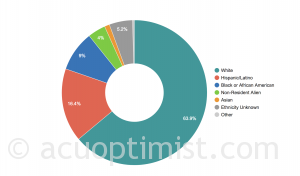The student population is over 16 percent Hispanic, classifying ACU as an emerging Hispanic-Serving Institution (HSI).
This classification is given to institutions that do not yet meet the 25 percent requirement to become an official HSI, and receive additional federal funds for expansion of student programs, but fall between 15 percent and 24 percent and show annual growth of the Hispanic student population, however, only 492 institutions meet the requirements to become an HSI.
Dr. Rhodes, Provost, said this classification is an important step for advancing student programs.
“It allows existing programs like McNair Scholars or the Trio program to have an advantage in the funding competition,” Rhodes said. “It also allows us to apply for funds that we cannot currently apply for to support Hispanic students.”
The growth of direct student support programs and the creation of new programs are two areas where the additional funds could be used. There are also HSI funds which can be specifically put toward science, technology and math programs on campus.

Graph courtesy of College Factual
Rhodes said he has a unique perspective concerning Hispanic students on campus and the support they need because his wife is also Hispanic and is a sponsor for the Hispanos Unidos club.
“Having the blessing of being married to her and experiencing the culture for now over 30 years and then having her have direct relationships with students on campus does give me good insight and it gives me an understanding of some of the student needs,” Rhodes said.
While ACU does not yet have access to HSI funding, Cynthia Rangel, junior convergence journalism major from Dallas and president of Hispanos Unidos, said the university helps Hispanic students adjust to the culture shock of moving to Abilene with the Hispanos Unidos club and the Office of Multicultural Affairs (OMA).
“I’m used to being surrounded by different types of cultures, so coming to a place where the social divide is very present was shocking to me, because I was not used to that,” Rangel said. “I do think ACU does a good job of welcoming us and helping us try to fit in.”
Rangel said the funds the school can apply for should be used in a way to further the education of students who could not otherwise afford it.
“I think it could go towards helping first-generation Hispanic students because I know a lot of the members in Hispanos Unidos are first generation,” Rangel said. “It should go toward helping fund Hispanic and Latino students on campus.”
